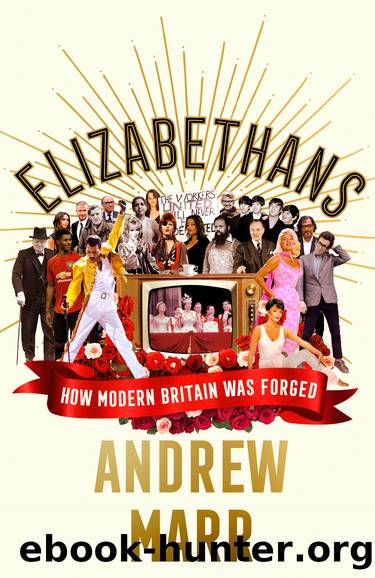Elizabethans by Andrew Marr

Author:Andrew Marr [Marr, Andrew]
Language: eng
Format: epub
Publisher: HarperCollins Publishers
Published: 2020-09-01T17:00:00+00:00
30
JAYABEN DESAI
One of the most persistent and headline-grabbing aspects of public life in Britain from the 1960s until the 1980s was the confrontation between organized labour, represented by the trade unions, and capital, represented by private companies and the state. We had railway strikes and council strikes and strikes in the car industry. We had the titanic confrontations in the coalfields and strikes in the dockyards (of which more later). We had the most political strikes between newspaper proprietors, such as Rupert Murdoch and Eddie Shah, and printers and journalists. School students went on strike and university students went on strike. Eventually even gravediggers went on strike. For a while, if you werenât on strike, you canât have been paying attention. But before Margaret Thatcher launched her legislative and physical campaign against the national enthusiasm for striking, we had Grunwick. And this is a story about race as much as about industrial relations.
From the summer of 1976 until the spring of 1978, a battle in a North London suburb over the right of workers in a photographic processing plant to have union recognition defined and explained much of what would follow. At Grunwick, the mutual misunderstandings, and the raw struggle for power, which had affected British working life for decades were played out like morality theatre. At Grunwick, each side saw themselves as the David against an opposing Goliath. But this time, on the one side were an Asian boss called George Ward and his British managers; and on the other, women from India, Pakistan and Africa. It was an intimate battle, about respect, in the new Britain. Female Asian workers, obliged to ask permission to go to the toilet and to accept mandatory overtime and long hours, saw their young white male managers as alien, tinpot tyrants. They had no intention of knowing their place.
Jayaben Desai, the tiny Asian woman who became a symbol of the strike, told her contemptuous manager Malcolm Alden: âWhat you are running here is not a factory, it is zoo. But in a zoo there are many types of animals. Some are monkeys who dance on your fingertips, others are lions who can bite your head off. We are those lions, Mr Manager.â Week in, week out, in her sari and overcoat, Desai led other Asian women on a picket line where they were jeered at and abused by furious managers. She was a hard woman to shake, however. When she felt the trade union movement was letting her down, she promptly went on hunger strike outside the TUC headquarters. To many on the left in Britain, she remains one of the great unsung heroes of the Queenâs reign.
Born in Gujarat, not far from where Freddie Mercuryâs family had started, Desai married a factory manager and settled in East Africa. She arrived in Britain in 1969, one victim of the wave of expulsions of Asians from Tanzania, Kenya and Uganda in the 1960s by African nationalist leaders. Better off than many Africans, and keeping
Download
This site does not store any files on its server. We only index and link to content provided by other sites. Please contact the content providers to delete copyright contents if any and email us, we'll remove relevant links or contents immediately.
| Africa | Americas |
| Arctic & Antarctica | Asia |
| Australia & Oceania | Europe |
| Middle East | Russia |
| United States | World |
| Ancient Civilizations | Military |
| Historical Study & Educational Resources |
Magic and Divination in Early Islam by Emilie Savage-Smith;(1530)
Papillon by Henry Charrière(1410)
Bohemians, Bootleggers, Flappers, and Swells: The Best of Early Vanity Fair by Bohemians Bootleggers Flappers & Swells- The Best of Early Vanity Fair (epub)(1394)
Ambition and Desire: The Dangerous Life of Josephine Bonaparte by Kate Williams(1380)
Twelve Caesars by Mary Beard(1309)
Operation Vengeance: The Astonishing Aerial Ambush That Changed World War II by Dan Hampton(1155)
What Really Happened: The Death of Hitler by Robert J. Hutchinson(1152)
London in the Twentieth Century by Jerry White(1139)
The Japanese by Christopher Harding(1129)
Time of the Magicians by Wolfram Eilenberger(1118)
Twilight of the Gods by Ian W. Toll(1110)
Lenin: A Biography by Robert Service(1071)
The Devil You Know by Charles M. Blow(1018)
A Social History of the Media by Peter Burke & Peter Burke(966)
Freemasons for Dummies by Hodapp Christopher;(960)
Napolean Hill Collection by Napoleon Hill(936)
Henry III by David Carpenter;(915)
The Churchill Complex by Ian Buruma(904)
The Rise and Triumph of the Modern Self by Unknown(904)
